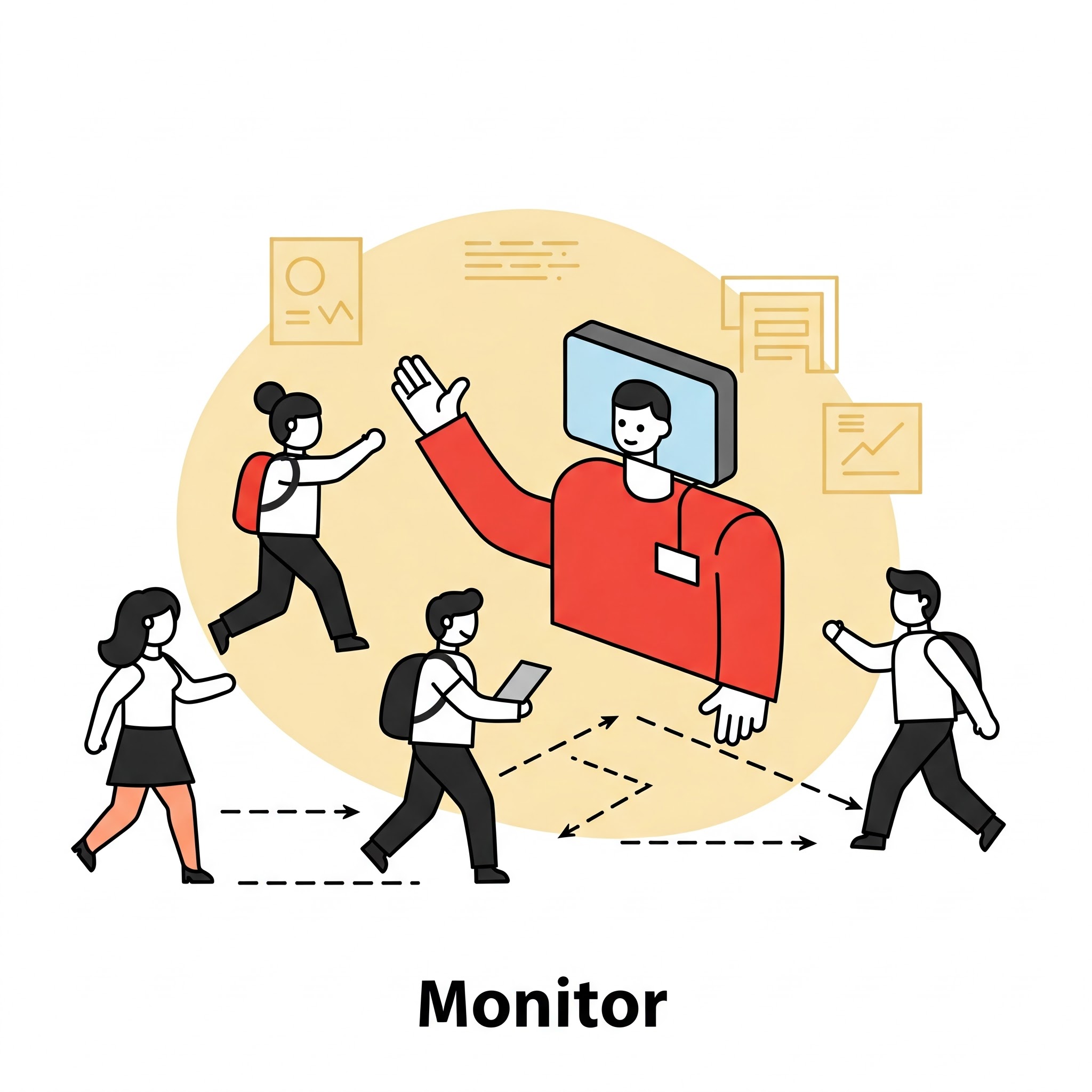Monitor
Definition
Monitor can function as a noun or a verb. As a noun, it refers to a device or individual that observes, checks, or keeps track of something. As a verb, it means to observe and check the progress or quality of something over a period of time.
Parts of Speech
- Noun
- Verb
Pronunciation
American English
- IPA Pronunciation: /ˈmɑː.nɪ.tɚ/
- Respelling: MAH-ni-ter
British English
- IPA Pronunciation: /ˈmɒn.ɪ.tə/
- Respelling: MON-i-tuh
Etymology
The word "monitor" originates from the Latin "monitor," meaning "one who reminds or advises," derived from "monēre," which means "to warn" or "to advise."
Derivatives
- Monitoring (noun)
- Monitored (adjective)
- Monitorial (adjective)
- Monitorship (noun)
- Self-monitor (noun/verb)
Synonyms
- Observer
- Watcher
- Supervisor
Antonyms
- Ignorant
- Neglecter
- Unwatchful
Usage
The term "monitor" is used in various contexts, including technology, education, and healthcare. For example, "The teacher assigned a student to monitor the class during her absence," or "The heart rate monitor showed stable readings."
Related Terms
- Surveillance: Close observation, especially of a person or group.
- Display: A screen that shows visual output.
- Control: The power to influence or direct behavior or the course of events.
Detailed Definitions
Noun
- A device used for observing, checking, or keeping a continuous record of a process or event:
- Example: "He installed a computer monitor to enhance his gaming setup."
- A person who observes or supervises others:
- Example: "The hall monitor ensured students followed the rules."
Verb
- To observe and check the progress or quality of something over a period of time:
- Example: "The doctor will monitor the patient’s recovery closely."
- To keep track of or regulate:
- Example: "The software is designed to monitor internet activity for security purposes."
monitor



🇨🇳 Mandarin (Simplified Chinese)
- 显示器 (xiǎnshì qì) - Monitor (as in computer)
- IPA Pronunciation: /ɕjɛn˧˥ʂʐ̩˥ t͡ɕʰi˥˥/
- Respelling: (shyen-shrr chee)
- 监视 (jiānshì) - Monitor, surveillance
- IPA Pronunciation: /t͡ɕiɛn˥ ʂʐ̩˥˩/
- Respelling: (jyen shrr)
🇮🇳 Hindi
- मॉनिटर (monitor) - Monitor (as in computer)
- IPA Pronunciation: /mɔːnɪʈər/
- Respelling: (maw-ni-tar)
- निरीक्षण करना (nirīkṣaṇ karnā) - To monitor, observe
- IPA Pronunciation: /niɾiːkʂən kəɾnɑː/
- Respelling: (nee-ree-kshan kar-naa)
🇪🇸 Spanish
- Monitor - Monitor (as in computer)
- IPA Pronunciation: /moˈnitoɾ/
- Respelling: (mo-nee-tor)
- Vigilar - To monitor, watch over
- IPA Pronunciation: /biˈxilaɾ/
- Respelling: (bee-hee-lar)
🇫🇷 French
- Écran - Monitor (as in computer)
- IPA Pronunciation: /ekʁɑ̃/
- Respelling: (eh-krahn)
- Surveiller - To monitor, watch over
- IPA Pronunciation: /syʁvɛje/
- Respelling: (syur-veye)
🇸🇦 Arabic (Modern Standard Arabic)
- شاشة (shāshah) - Monitor (as in computer)
- IPA Pronunciation: /ˈʃaːʃa/
- Respelling: (shaa-shah)
- راقب (raqiba) - To monitor, observe
- IPA Pronunciation: /raːqaba/
- Respelling: (raa-ki-bah)
🇧🇩 Bengali
- মনিটর (monitor) - Monitor (as in computer)
- IPA Pronunciation: /moniʈor/
- Respelling: (moh-nee-tor)
- পর্যবেক্ষণ করা (pôryôbēkṣaṇ kôra) - To monitor, observe
- IPA Pronunciation: /pɔrjɔbɛkʃɔn kɔra/
- Respelling: (por-yo-bek-shon kor-a)
🇷🇺 Russian
- Монитор (Monitor) - Monitor (as in computer)
- IPA Pronunciation: /mɐˈnʲitər/
- Respelling: (muh-nee-tuhr)
- Отслеживать (Otslezhivat') - To monitor, track
- IPA Pronunciation: /ɐtslʲɪˈʐivətʲ/
- Respelling: (ot-sle-zhi-vat)
🇵🇹 Portuguese
- Monitor - Monitor (as in computer)
- IPA Pronunciation: /mõniˈtoɾ/
- Respelling: (moh-nee-tor)
- Monitorar - To monitor, watch over
- IPA Pronunciation: /moniˈtoɾaɾ/
- Respelling: (moh-nee-toh-rahr)
🇮🇩 Indonesian
- Monitor - Monitor (as in computer)
- IPA Pronunciation: /monitɔr/
- Respelling: (moh-nee-tor)
- Memantau - To monitor, observe
- IPA Pronunciation: /məmantau/
- Respelling: (muh-man-tau)
🇩🇪 German
- Monitor - Monitor (as in computer)
- IPA Pronunciation: /moˈniːtoːɐ̯/
- Respelling: (mo-nee-tohr)
- Überwachen - To monitor, supervise
- IPA Pronunciation: /ˈyːbɐˌvaxən/
- Respelling: (ue-ber-vah-khen)
🇯🇵 Japanese
- モニター (Monitā) - Monitor (as in computer)
- IPA Pronunciation: /monitaː/
- Respelling: (mo-nee-tah)
- 監視する (Kanshi suru) - To monitor, watch over
- IPA Pronunciation: /kaɴɕi suɾu/
- Respelling: (kan-shee soo-roo)
🇻🇳 Vietnamese
- Màn hình - Monitor (as in computer)
- IPA Pronunciation: /maːn˧˩ hiɲ˧˩˧/
- Respelling: (man hin)
- Giám sát - To monitor, supervise
- IPA Pronunciation: /zaːm˧˩ saːt˧˩˧/
- Respelling: (zahm saht)
🇰🇷 Korean
- 모니터 (moniteo) - Monitor (as in computer)
- IPA Pronunciation: /monitʰʌ/
- Respelling: (moh-nee-teo)
- 감시하다 (gamsihada) - To monitor, observe
- IPA Pronunciation: /gʰamɕʰiada/
- Respelling: (gam-shee-ha-da)
🇹🇷 Turkish
- Monitör - Monitor (as in computer)
- IPA Pronunciation: /monitoɾ/
- Respelling: (moh-nee-tohr)
- İzlemek - To monitor, watch
- IPA Pronunciation: /izlemec/
- Respelling: (eez-le-meck)
🇵🇰 Urdu
- مانیٹر (Monitor) - Monitor (as in computer)
- IPA Pronunciation: /mɔːniʈər/
- Respelling: (maw-nee-tar)
- مانیٹر کرنا (monitor karna) - To monitor, observe
- IPA Pronunciation: /mɔːniʈər kərnɑː/
- Respelling: (maw-nee-tar kar-naa)





